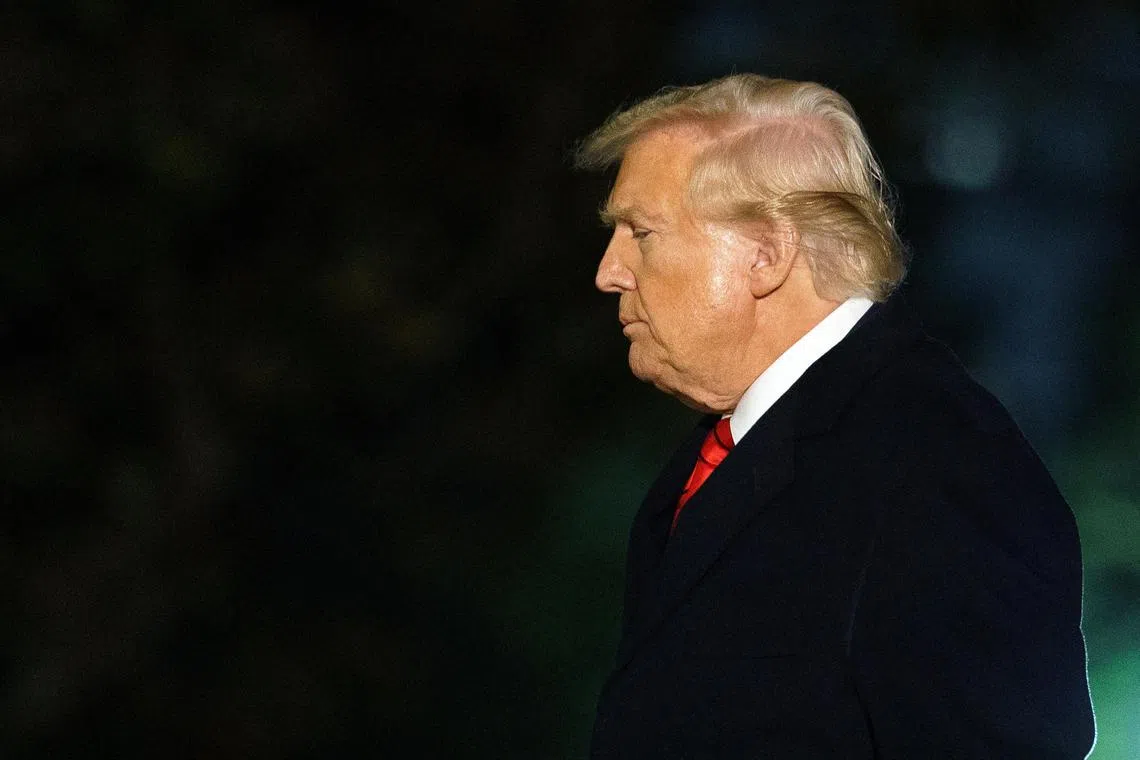Trump’s copper, aluminium tariffs may raise costs for US consumers
Sign up now: Get ST's newsletters delivered to your inbox

Analysts argue that US President Donald Trump's plan for tariffs on imports to bolster the country’s manufacturing sector may undercut his price cutting pledge.
PHOTO: EPA-EFE
MELBOURNE – President Donald Trump’s vow of tariffs on US copper and aluminium imports would result in higher costs for local consumers because of a shortfall of domestic production and the length of time it would take to renew the industry, analysts and industry sources said on Jan 28.
In a speech to Republican lawmakers on Jan 27, Mr Trump said he would impose the tariffs on aluminium and copper – metals that are needed to produce US military hardware – as well as steel, to entice producers to make them in the US.
“We have to bring production back to our country,” he said.
Mr Trump won the US presidency in November 2024 vowing to lower costs for consumers still smarting from an inflation surge in the first half of his predecessor Joe Biden’s term.
But analysts argue his plan for tariffs on imports to bolster the country’s manufacturing sector, another of his promises, may undercut his price cutting pledge.
It was not clear how broadly the tariffs could be applied, but some mining chief executives have previously said they are preparing for different scenarios as markets brace themselves for a potential change to trade flows.
“There are a few unknowns here. Will these tariffs be enacted, and at what scale, and who will pay? Ultimately, they generally get paid by the consumer, particularly in the case where there’s no domestic substitute,” said analyst Daniel Morgan at Sydney investment bank Barrenjoey.
US aluminium and copper smelters have been closing and would need new infrastructure and power contracts to restart, among other measures, all of which take time, he said.
Aluminium producers in Canada such as Rio Tinto and Alcoa would be unlikely to take revenue hits, instead the costs would likely be rolled to automakers, who would then pass them to US consumers, he added. Rio Tinto declined to comment.
An Alcoa spokesperson pointed to comments from CEO William Oplinger from a results call last week that flagged the potential for “wide-ranging effects on supply, demand and trade flows”.
He estimated that a 25 per cent tariff on current Canadian export volumes to the US could represent US$1.5 billion (S$2.03 billion) to US$2 billion of additional annual costs for US customers.
An executive at India’s top mining lobby group noted the US is the biggest export market for its aluminium, and it expects India’s government to take action by convincing Mr Trump not to issue any levies.
“If Trump imposes tariffs, it will have an adverse impact particularly on aluminium because Europe is already on path to impose a carbon tax and the UK might do it too,” said additional secretary general B.K. Bhatia at the Federation of Indian Mineral Industries.
On copper, Mr John Fennell, CEO of the International Copper Association Australia said any tariff on imports to the US would impact its industry given the country is a net copper importer, although it may speed the development of new mines such as Rio Tinto’s Resolution in Arizona.
“This could be good for new mines like Resolution, but that is many years off, and the pain would be felt by local manufacturers paying the tariffs in the interim,” he said.
Freeport-McMoRan CEO Kathleen Quirk said last week that the miner would not be affected by any copper tariffs as they sell all their US copper domestically and their Indonesian metal goes to Asia. But she worried about any potential inflationary effects of copper tariffs.
In Japan, the world’s third-largest steelmaker, steel and aluminium tariffs during Mr Trump’s previous term had a limited impact, noted senior economist Tomomichi Akuta at Mitsubishi UFJ Research and Consulting.
“The majority of Japan’s steel exports are value-added speciality products. And since value-added products were excluded, we expect a similar approach this time. These value-added products are difficult to substitute, making them less likely to be targeted,” Mr Akuta said. REUTERS


